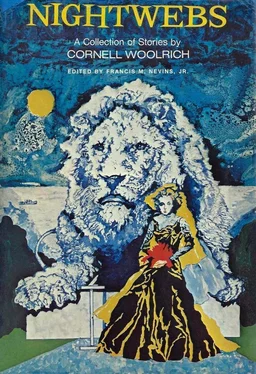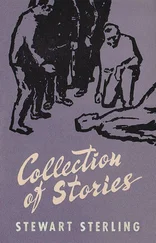Somebody knocked.
“See who that is,” he told the valet.
Nunez came back, his face chalky, his jaw hanging slack.
“What’s the matter? You look like you’ve seen a ghost.”
“I–I have just received a message from one,” Nunez faltered. “She must be one!” He crossed himself.
Freshman took the box from him, examined the giant white carnation. He tore open the enclosed note and read it:
But if you will wear my flower in your coat, and if you will play Symphonie for me, you will make me supremely happy.
An aficionada who has not the courage to come closer.
“Every night, for three weeks now,” the terrified Nunez quavered. “It must be flowers from the dead!”
Freshman sat down suddenly on a chair. He stayed there for several moments without saying anything. Then he got up again as suddenly and bolted out.
“I’ve got things to do!” he exclaimed. “I’ll be back. Don’t touch anything.”
He returned an hour later. Nunez was still hanging around, too unnerved by the shock he had received to loot the place and clear out, as he would have done under ordinary circumstances. He smelled strongly of Jones’ brandy, but he was cold sober none the less.
“It’s all right,” Freshman said. “I went down to headquarters and compared the two notes for handwriting. Then I went to the Club New York and cross-questioned the waiter. After that I went to a couple of other addresses, and talked to a couple of other people.”
“She — she is alive, senor?”
“If you mean the woman who’s been sending Jones these carnations every night for three weeks, she sure is. And she’s going to be sitting there tonight in the club big as life and wondering what became of him.”
“Then why are they still holding him? Why don’t they let him go?”
“Because the woman who invited him to Apartment Forty-four, One-twenty-six Valencia Street, is just as surely dead. She’s lying in the morgue right now. I just saw her with my own two eyes.”
Nunez shuddered, his eyes rolling in his head.
“These are two different women, amigo,” Freshman explained. “That’s the waiter’s dumbness, and my own carelessness in not comparing the two notes while he still had them both on him, and this damn Spanish indoor sport of sending mash-notes around night clubs by the dozen. The note wasn’t meant for him; it was meant for somebody else. Two different people, carrying on a quiet little flirtation of their own from table to table, for some weeks past.”
Freshman frowned thoughtfully. “I think what must have happened is, her admirer was sitting between her and Jones, and the waiter carried it to the wrong man. Instead of waiting to see that it had arrived safely, she grew timid and hurried away. Then the party it was intended for, also got up and left, thinking he’d been turned down.
“I don’t blame the waiter too much. He’s supposed to take orders for drinks, not play the part of Cupid.”
Nunez carefully folded a hand-painted French necktie. He signed ponderously.
“But why did my patron kill her? That part is what mystifies me. It was not like him. I know him, I worked for him too long. He has a heart of gold. He would not hurt anyone. He would give the shirt off his back—”
“That part isn’t going to make much sense to you,” Freshman admitted. “You see, he was already wanted for something like this back in his own country. And if he had to stand trial for murder, he wanted it to be here in Spain, and not—”
He didn’t finish it. He saw masked men, a burning barn, the screams of a roasting human being.
“I still don’t understand,” Nunez said helplessly. “Why commit a crime just because you want to be tried for it in some particular place? All you have to do is not commit it in the first place, then you wouldn’t have to be tried for it any place at all.”
“I knew you wouldn’t understand,” Freshman said, closing the last valise. “He does, though. And I do.” And then he added softly, “And I guess that’s just something between the two of us.
The desk clerk received a call early that afternoon, asking if there was a “nice, quiet” room available for about six o’clock that evening. The call was evidently from a business office, for the caller was a young woman who, it developed, wished the intended reservation made in a man’s name, whether her employer or one of the firm’s clients she did not specify. Told there was a room available, she requested, “Well, will you please hold it for Mr. Edgar Danville Moody, for about six o’clock?” And twice more she reiterated her emphasis on the noiselessness. “It’s got to be quiet, though. Make sure it’s quiet. He mustn’t be disturbed while he’s in it.”
The desk man assured her with a touch of dryness, “We run a quiet hotel altogether.”
“Good,” she said warmly. “Because we don’t want him to be distracted. It’s important that he have complete privacy.”
“We can promise that,” said the desk clerk.
“Thank you,” said the young woman briskly.
“Thank you,” answered the desk man.
The designated registrant arrived considerably after six, but not late enough for the reservation to have been voided. He was young — if not under thirty in actuality, still well under it in appearance. He had tried to camouflage his youthful appearance by coaxing a very slim, sandy mustache out along his upper lip. It failed completely in its desired effect. It was like a make-believe mustache ochred on a child’s face.
He was a tall lean young man. His attire was eye-catching — it stopped just short of being theatrically flamboyant. Or, depending on the viewer’s own taste, just crossed the line. The night being chilly for this early in the season, he was enveloped in a coat of fuzzy sand-colored texture, known generically as camel’s-hair, with a belt gathered whiplash-tight around its middle. On the other hand, chilly or not, he had no hat whatever.
His necktie was patterned in regimental stripes, but they were perhaps the wrong regiments, selected from opposing armies. He carried a pipe clenched between his teeth, but with the bowl empty and turned down. A wide band of silver encircled the stem. His shoes were piebald affairs, with saddles of mahogany hue and the remainder almost yellow. They had no eyelets or laces, but were made like moccasins, to be thrust on the foot whole; a fringed leather tongue hung down on the outer side of each vamp.
He was liberally burdened with belongings, but none of these was a conventional, clothes-carrying piece of luggage. Under one arm he held tucked a large flat square, wrapped in brown paper, string-tied, and suggesting a picture-canvas. In that same hand he carried a large wrapped parcel, also brown-paperbound; in the other a cased portable typewriter. From one pocket of the coat protruded rakishly a long oblong, once again brown-paper-wrapped.
Although he was alone, and not unduly noisy either in his movements or his speech, his arrival had about it an aura of flurry and to-do, as if something of vast consequence were taking place. This, of course, might have derived from the unsubdued nature of his clothing. In later life he was not going to be the kind of man who is ever retiring or inconspicuous.
He disencumbered himself of all his paraphernalia by dropping some onto the floor and some onto the desk top, and inquired, “Is there a room waiting for Edgar Danville Moody?”
“Yes, sir, there certainly is,” said the clerk cordially.
“Good and quiet, now?” he warned intently.
“You won’t hear a pin drop,” promised the clerk.
Читать дальше












